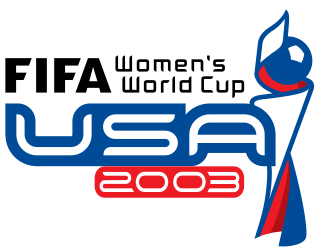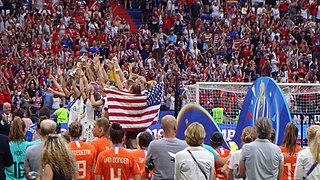Group F of the women's football tournament at the 1996 Summer Olympics was played from 21 to 25 July 1996, and included Brazil, Germany, Japan and Norway. The top two teams advanced to the Semi-finals, while the bottom two placed teams were eliminated from the competition. [1]
| Pos | Team | Pld | W | D | L | GF | GA | GD | Pts | Qualification |
|---|---|---|---|---|---|---|---|---|---|---|
| 1 | 3 | 2 | 1 | 0 | 9 | 4 | +5 | 7 | Semi-finals | |
| 2 | 3 | 1 | 2 | 0 | 5 | 3 | +2 | 5 | ||
| 3 | 3 | 1 | 1 | 1 | 6 | 6 | 0 | 4 | ||
| 4 | 3 | 0 | 0 | 3 | 2 | 9 | −7 | 0 |
| Norway | 2–2 | |
|---|---|---|
| Medalen Aarønes | Report (FIFA) | Pretinha |
| Brazil | 2–0 | |
|---|---|---|
| Kátia Pretinha | Report (FIFA) |
| Brazil | 1–1 | |
|---|---|---|
| Sissi | Report (FIFA) | Wunderlich |
| Norway | 4–0 | |
|---|---|---|
| Pettersen Medalen Tangeraas | Report (FIFA) |

The 2003 FIFA Women's World Cup was the fourth edition of the FIFA Women's World Cup, the quadrennial championship of women's national soccer teams organized by FIFA. It was held in the United States from September 20 to October 12, 2003, at six venues in six cities across the country. The tournament was won by Germany, who became the first country to win both the men's and women's World Cup.

The 1995 FIFA Women's World Cup, the second edition of the FIFA Women's World Cup, was held in Sweden and won by Norway, who became the first European nation to win the Women's World Cup. The tournament featured 12 women's national teams from six continental confederations. The 12 teams were drawn into three groups of four and each group played a round-robin tournament. At the end of the group stage, the top two teams and two best third-ranked teams advanced to the knockout stage, beginning with the quarter-finals and culminating with the final at Råsunda Stadium on 18 June 1995.

The United States (USA) was the host nation for the 1996 Summer Olympics in Atlanta. 646 competitors, 375 men and 271 women, took part in 263 events in 31 sports.

Germany competed at the 1996 Summer Olympics in Atlanta, United States. 465 competitors, 278 men and 187 women, took part in 234 events in 26 sports.

The 1996 Men's Olympic Football Tournament, played as part of the 1996 Summer Olympics, was hosted in Birmingham, Alabama, Washington, D.C., Orlando, Florida, Miami, Florida and Athens, Georgia. From 1992 onwards, male competitors should be under 23 years old and starting from this tournament, a maximum of three over-23 players are allowed per squad. The tournament featured 16 national teams from the six continental confederations. The 16 teams were drawn into four groups of four and each group played a round-robin tournament. At the end of the group stage, the top two teams advanced to the knockout stage, beginning with the quarter-finals and culminating with the gold medal match at Sanford Stadium on August 3, 1996.

Argentina competed at the 1996 Summer Olympics in Atlanta, United States. 178 competitors, 131 men and 47 women, took part in 101 events in 20 sports.

Brazil competed at the 1996 Summer Olympics in Atlanta, United States. 225 athletes – 159 men, 66 women – competed in 18 sports. The country set a record with both 15 medals – only surpassed in 2008 – and 3 golds – surpassed in 2004 with five.

The 1996 Summer Olympics—based in Atlanta, Georgia, United States—marked the first time that women participated in the Olympic association football tournament. The tournament featured eight women's national teams from four continental confederations. The teams were drawn into two groups of four and each group played a round-robin tournament. At the end of the group stage, the top two teams advanced to the knockout stage, beginning with the semi-finals and culminating with the gold medal match on August 1, 1996.
Sonia Denoncourt is a retired soccer referee from Canada. She worked for FIFA as head of women's referee development, Director of Refereeing at Concacaf and currently work as the North America Academy Director at You Are The Ref International.

The football tournament at the 2000 Summer Olympics was the second edition of the women's Olympic football tournament and was held from 13 to 28 September 2000. It was hosted at three venues along the Eastern side of Australia with matches being held in Sydney, Canberra and Melbourne.
The World XI, also known as the FIFA World Stars, is an association football team consisting of players from various countries. The World XI play one-off games against clubs, national teams, collectives of continental teams.

The United States women's national soccer team is the most successful women's national team in the history of the Women's World Cup, having won four titles, earning second-place once and third-place finishes three times. The United States is one of five countries including Germany, Japan, Norway, and Spain to win a FIFA Women's World Cup.. The United States was also the only team that played the maximum number of matches possible in every tournament until they got eliminated in the round of 16 in 2023.
The Ghana women's national football team has represented Ghana at the FIFA Women's World Cup on three occasions: in 1999, 2003, and 2007.
The Nigeria women's national football team has represented Nigeria at the FIFA Women's World Cup at all nine stagings of the tournament, one of seven teams to do so. Despite the rich history, however, Nigeria's successes have been rather modest, having only progressed to the knockout phase in three occasions.

The Germany women's national football team has represented Germany at the FIFA Women's World Cup on nine occasions in 1991, 1995, 1999, 2003, 2007, 2011, 2015, 2019 and 2023. They have won the title twice and were runners-up once. They also reached the fourth place in 1991 and in 2015.
The Norway women's national football team has represented Norway at the FIFA Women's World Cup on nine occasions in 1991, 1995, 1999, 2003, 2007, 2011, 2015, 2019 and 2023. They were runners up in 1991. They won the following tournament in 1995. They also reached the fourth place in 1999 and in 2007.
The China women's national football team has represented China at the FIFA Women's World Cup on eight occasions in 1991, 1995, 1999, 2003, 2007, 2015, 2019 and 2023, finishing as runners up once (1999) and once in fourth place (1995). Alongside Japan and Australia, they became one of the only three Asian Football Confederation teams to finish on the top four of the FIFA Women's World Cup.

The Brazil women's national football team has represented Brazil at the FIFA Women's World Cup on all ten occasions to date. As the most successful women's national football team in South America, Brazil is also the best-performing South American team at the FIFA Women's World Cup, reaching two podium finishes. Brazil will host the 2027 FIFA Women's World Cup.

The Sweden women's national football team has represented Sweden at the FIFA Women's World Cup on nine occasions in 1991, 1995, 1999, 2003, 2007, 2011, 2015, 2019 and 2023. There were runners up once and four times bronze medalists: in 1991, in 2011, in 2019 and in 2023.
The France women's national football team has represented France at the FIFA Women's World Cup at five stagings of the tournament, in 2003, 2011, 2015, 2019 and 2023, they hosted in 2019.